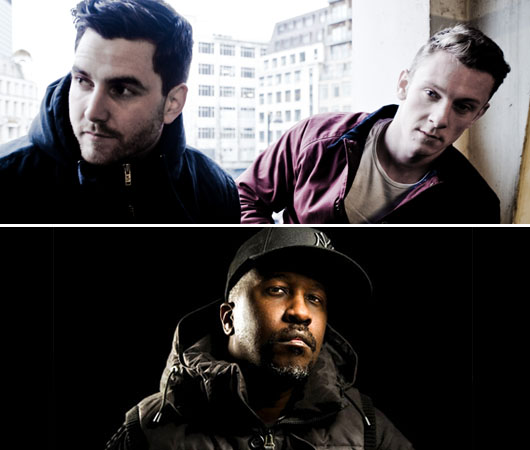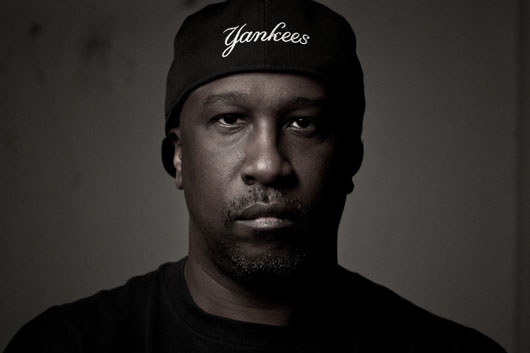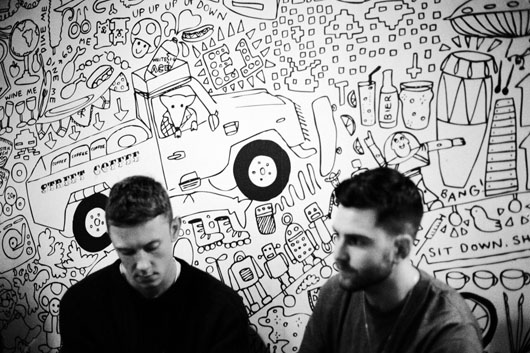B2B: Bicep and Todd Terry
By bringing together Irish-born duo Bicep and legendary NYC DJ/producer Todd Terry, we had hoped […]

B2B: Bicep and Todd Terry
By bringing together Irish-born duo Bicep and legendary NYC DJ/producer Todd Terry, we had hoped […]

By bringing together Irish-born duo Bicep and legendary NYC DJ/producer Todd Terry, we had hoped to catalyze a lively discussion on the current state of house music, and—considering Terry’s history as a longtime innovator in the field—gain some persepctive on the retro-minded sounds informing much of today’s house productions. For the most part, that’s what we got, as Bicep’s Matthew McBriar and Andrew Ferguson—who begin an extensive North American tour in San Francisco later today—picked the veteran producer’s brain while also offering some insight into their current place amongst the growing ’80s- and ’90s-house revival. Of course, we were bound to get a bit sidetracked somewhere down the line, but who could blame the Bicep boys for not passing up on an opportunity to ask Terry—who, we should mention, just releaunched his long-running Freeze imprint with a new EP—where exactly his trademark snare sounds come from.
XLR8R: How did you each begin producing house music?
Todd Terry: I used to do more hip-hop [production] when I first started, then I got into house because a friend of mine showed me a cassette tape of house beats and said I should try to make some stuff like that. That’s how I started.
Matthew McBriar: For us, we first grew up on techno, actually. As we got older, our tastes mellowed and we wanted something perhaps a bit more sociable, which got us into disco and then led us to house. We’ve always had an interest in house, but it became our main focal point in the last five years, whereas we’ve been into techno for something like 10 years now.
XLR8R: What was it that attracted you to house?
MM: There’s a lot more soul. The techno we were listening to was quite heavy, and that was the main club music in Ireland while we were growing up. As our tastes matured, we looked for something with a bit more soul and vocals even.
Andrew Ferguson: Disco was really big for us. There was even a bit of disco influence in the techno we liked as well. We’d hear disco samples popping up on the tracks we liked over and over again, and that got us interested in disco, which then got us into house. It’s all related. We still love all three.
MM: Do you feel your tastes have changed a lot over the years, Todd, or are you still after the same feeling you were in the ’80s?
TT: Well, I’ve always been one of those guys that doesn’t really care—I’ll do a drum & bass album, I’ll do a dubstep album—I don’t really care. If they criticize it, then good, it means they’re listening. I’ll do a record with anybody, you know? I think that’s the challenge of it. If you can do that and two out of the 10 come out good, then you’re the greatest thing ever, so why not give it a try?
AF: Was that your approach when you first started making house? Coming from the hip-hop world, did you just want to try to make a bit of everything?
TT: Yeah. I’m the type that doesn’t really care what people say or what they feel [when it comes to my music]. On a dancefloor, I care about a crowd, but when it comes to making music, I really don’t care, and that’s always how I’ve felt. Coming into house, I just did what I wanted, whether it was a sample track or a big vocal-house record or a real gospel-house record—I just wanted to do what I wanted to do and I think that’s the real power of music. I’ve done remixes, and that’s a horrible place to be in because you’re pleasing somebody, that can be hard to tackle.
AF: I think that comes through in your music. Listening to your old tracks, your style sticks out, you can hear that it’s going to be a Todd Terry record in, like, two or three beats. It’s amazing that you have your own stamp.
TT: Yeah, I try to have that. Sometimes if I have to pop it up or make a record that is a little harder, then it can sound different. I still try to stay in the vein of what’s happening if I can.
Todd Terry by Jos Kottmann

MM: Do you feel like your production process has changed much over the last 20 years?
TT: Every record is different. One record I can be doing things a lot simpler and another one I’ll put in a lot more music and a lot more work. It’s really all about the record. Every record gives me a different flavor and that’s what I try to give back.
MM: Do you find yourself still using the same studio equipment or have you moved on to more laptop-type production?
TT: I’m straight laptop now, but before, it was two-inch tape machines, SP-1200 drum machines, and five different keyboards. Now, I do everything on a laptop and I get my engineer to mix it. I am creating on my own still, but just in a smaller box.
MM: It’s kind of funny, because we started on laptops and have slowly worked to now using machines. We’ve gone in the opposite direction. For us, it was the sound. I think that’s why there has been such a resurgence in the old house sound—it is a lot rawer, and it can be hard to get that sound in a laptop sometimes.
TT: Yeah, it’s good to come back and just grab a drum machine and a keyboard and just play it, or hook up a vocoder or something with quarter-inch plugs; that’s still a good feeling too.
XLR8R: There is a lot of house being made today that references the classic sounds of guys like Todd Terry and vintage Detroit. Do you guys think there is too much of an emphasis on these old sounds?
MM: I feel like a lot of early house music is very carefree—huge vocals and big pianos, it was very positive. With the whole minimal techno era that happened, things got very cold and clinical at times, and I think it’s natural that people would eventually want something more carefree. Music works in cycles. Still, it’s very important to move forward. Our tracks last year obviously drew influence from the past, and now we feel like we want to move forward. The music we’ve been working on recently is maybe different than people would expect.
AF: We’re still trying to draw influence from the past and that vibe, but we’re using that to create a [new] hybrid.
MM: It’s one of those things—you always get trends every year, but ultimately, it’s about if the music is good, then it’s good and if it’s not, then it’s not. If it makes people dance and they’re happy, then that is great.
XLR8R: Maybe you’d have some advice here Todd, on how you’ve been able to sustain a production career while evolving and moving your craft forward?
TT: Well now, I do a lot of collaborations. If I work with a newer guy, it puts the edge on me a lot more, and that works really well for me right now. If I work with a new, young kid it really opens up a lot of doors for me, so I try to look for those opportunities.
AF: Do you feel like you’re still learning in the production process?
TT: Yeah, always. There are always different sounds, different warps, vocal tricks, drum rolls, echoes—I can always learn from these kids because they are looking at producing way differently than I did. I was brought up making music and they’re brought up making sounds, that’s a big difference. I see what it is, it’s all about the sound to them. Me, I’ll take a piano and make music, but they’ll take a piano and warp it.
MM: I think that’s another reason why the old-school resurgence is happening, because while the sound-design element is important, people feel like getting back to that real musical feel is equally important now.
Bicep

TT: I hope so, because it’s really hard to make music without using music. [laughs] I’m glad that it’s getting back to real house music; I feel like I could make a piano-house record tomorrow. Over the last couple of years, I think we lost a lot of that feeling with all the bleeps and stuff like that. I’m not knocking it, I like some of it, but it has to be a bit more musical because it seems like we brought up a bunch of kids that don’t like music; they didn’t get to hear real music enough, so how are they going to like it?
AF: Yeah. For us, when we’re listening to tracks and making tracks, there has to be an element of emotional content. It has to have some sort of feeling to it.
TT: I think you have to do it all today. If you put out an EP or an album it has to be a soundtrack, it has to have a variety of records on it, and you have to feel good about it for yourself. If you don’t get that element going, it’s not going to last.
AF: You mentioned that you had struggled with remixes because you had to please certain people. Are there any particular ones that come to mind?
TT: I went through a lot of it. I’ve had A&R guys tell me that the snare drum was too loud. What are you going to do there? You have to please the label and the artist. I don’t take on many remixes now. If I do, they get what they get, but sometimes a label will want a certain thing. Sometimes they say they want Todd Terry, but they really want Todd Terry to sound like this guy, which is defeating the purpose.
AF: Has that changed particularly in the last couple of years?
TT: I think it’s been like that for the last seven years or so. At a certain point, they started wanting me to sound like something or someone particular. People behind a desk are difficult to please. They’re behind the desk, not behind the DJ booth with you. They see some charts and hear some trance sounds and then make their decisions. People love the music, but what sucks is the industry.
MM: What are your plans release-wise for the next few years? Have you thought about going back to your roots and making a piano record or something like that again?
TT: I’ve always been at my roots whether people notice it or not. I’ve always done a little bit of this, a little bit of that. I’m not running away from house, but every once in a while, I want to do a different beat; I want to do a breakdance record or a freestyle record. If I feel like doing it, I’m just going to do it. I just did the Todd Terry vs. Hip-Hop album because I wanted to do it. I just want to stay like me. [laughs] It can be hard in this business, but I have to stick to that because I think that’s what has kept me here for 27 years. You have to do it as a feeling, not just because someone wants you to put a warp sound on their track. It’s important that you want to do it.

XLR8R: And what about Bicep, do you guys have any particular plans for 2013?
MM: Now that we have our own label, it’s given us the freedom to produce any type of music we want without a certain label or a certain audience in mind, so I think we’ll be varying our songs a lot more moving forward. With touring increasing so heavily recently, it’s become harder to find time to be in the studio and to experiment, practice, and try out new machines, so over the next year, we’re going to spend as much time making music as possible.
AF: We’re still developing our own sound. In our heads, all our stuff sounds like us, but we really want that to translate across all of our music. There has to be an element that people find is us, no matter what type of record we make.
MM: So this is completely off topic here, but I just have to ask. Todd, I read somewhere that you used to make your snare sounds from a ping-pong ball recording, is that true?
TT: [Laughs] We used to go to the basketball court and get shit, hit sticks against walls—sometimes I’d be bugging out and would go outside and just start recording myself hitting garbage cans and stuff like that. I really got into Art of Noise and Kraftwerk, and liked how they used certain unexpected sounds. I haven’t done that in 16 years, but I used to go out and hit walls and tell people to act like a snare. [laughs] I’d get drums from all different types of sounds. A lot of jazz records have the best snares, the breakdowns sound great. A lot of old-school rap records have nice snare drums too—they’re really ugly with lots of reverb, but they sound great on house records.
MM: I think that’s amazing. I think it’s a shame that as the music and technology has moved forward, some of that technique has been lost. The old-school, hip-hop-sampling element really gives that era of music a quality that is hard to recreate.
TT: Yeah, but there is still only three percent of us that really give a fuck about stuff like that, to tell you the truth. If a kid hears it in the club, he’s not going to care that some sound is from a garbage can or something like that.
XLR8R: That’s what makes it fun for you guys as producers though, right? Following through and caring about those details that no one may ever notice?
TT: Yeah, I try have fun with it, but it’s a business and I have to pay some bills every now and then. I try to do two records for the people and two for myself every month. I’m doing a freestyle album right now—makes no sense at all, but I’m doing it. I’m setting up a session to bug out and do some music with a Latin band in June. I think that people have alienated the fun out of music. We have to get the dancefloor back to where people are having fun and it’s interesting.

